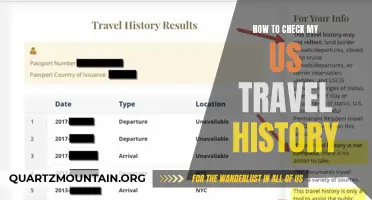
Travelling to Canada can be an exciting and fulfilling experience, whether it's to explore the stunning landscapes, immerse oneself in the vibrant cities, or visit loved ones. However, before embarking on this journey, it is crucial to understand the requirements for a Canada tourist visa, including the need to provide a travel history. In this article, we will explore why Canadian authorities request this information, what it entails, and how to comply with this requirement. So, if you are planning a trip to the Great White North, read on to ensure a smooth and hassle-free entry into Canada.
What You'll Learn

Importance of travel history for Canada tourist visa application
Travel history is an important factor to consider when applying for a Canada tourist visa. The Canadian immigration authorities use this information to assess the applicant's credibility and intentions for visiting the country. While having a travel history is not a mandatory requirement, it can significantly increase the chances of getting a tourist visa approved.
Having a travel history demonstrates that the applicant is a genuine traveler who has adhered to visa regulations in the past. It shows that they have respected the immigration laws of other countries and have a track record of leaving the destination country before their visa expires. This is highly valued by Canadian immigration officers as it gives them confidence that the applicant will also adhere to the regulations in Canada.
Travel history also provides evidence of the applicant's financial stability and ability to support themselves during the trip. By looking at previous trips, immigration officers can see if the applicant has taken multiple international trips and if they have been able to finance these trips without any issues. This gives them assurance that the applicant will be able to support themselves during their visit to Canada, reducing the risk of them becoming a burden on the Canadian government or its citizens.
Furthermore, travel history can demonstrate that the applicant has a genuine interest in tourism and exploring different cultures. It shows that the applicant has a desire to travel and gain new experiences, which aligns with the purpose of a tourist visa. By having a diverse travel history, applicants can prove that they are genuinely interested in exploring new places and will make the most out of their visit to Canada.
If an applicant does not have a travel history, it does not necessarily mean that their tourist visa application will be rejected. In such cases, it is important to provide other supporting documents to strengthen the application. This may include documents such as employment letters, bank statements, and a detailed travel itinerary, among others. These documents can help demonstrate the applicant's financial stability and the purpose and duration of their trip, compensating for the lack of a travel history.
In conclusion, while travel history is not a mandatory requirement for a Canada tourist visa, it holds substantial importance in the assessment process. It provides evidence of the applicant's credibility, financial stability, and genuine interest in tourism, increasing the chances of a successful visa application. However, even without a travel history, applicants can still strengthen their application by providing other supporting documents that demonstrate their intention to visit Canada for tourism purposes.

How to demonstrate travel history for Canada tourist visa
If you are planning to apply for a Canada tourist visa, it is advantageous to demonstrate your travel history. This is because a history of international travel can strengthen your visa application and increase your chances of obtaining a favorable decision.
Here are some ways to demonstrate your travel history for a Canada tourist visa:
- Collect and organize travel documents: Gather all the relevant travel documents from your previous trips, such as passport stamps, visa copies, boarding passes, hotel reservations, and travel itineraries. This will serve as evidence of your previous travel experiences.
- Provide a detailed travel itinerary: Create a detailed itinerary of your previous trips, including the dates, destinations, and purpose of each trip. This will help the visa officer assess the extent of your travel history.
- Include travel photos: Include a selection of travel photos that showcase your previous trips. This can help provide visual evidence of your travel experiences and make your application more compelling.
- Provide proof of financial capability: To demonstrate your ability to travel, consider providing proof of your financial capabilities, such as bank statements, salary slips, or income tax returns. This will show that you have the means to undertake international travel.
- Explain the purpose of your previous trips: Clearly explain the purpose of your previous trips, whether they were for leisure, business, education, or family visits. This will help the visa officer understand your travel history better and assess the genuineness of your intentions.
- Highlight any previous visa approvals: If you have obtained visas from other countries in the past, include copies of those visas along with your application. This can demonstrate that you have a history of complying with immigration regulations.
- Write a travel history statement: Include a statement summarizing your travel history, highlighting the countries you have visited, the duration of each trip, and the purpose of your visits. Be concise, yet provide enough detail to demonstrate your travel experience.
- Show ties to your home country: To address any concerns of overstay or immigration intent, provide evidence of strong ties to your home country. This can include proof of employment, property ownership, family commitments, or educational enrollment.
Remember, your travel history is just one aspect of your visa application. It is equally important to meet the other visa requirements, such as having a solid travel plan, sufficient funds, and strong ties to your home country.
In conclusion, demonstrating your travel history for a Canada tourist visa can greatly enhance your application. By collecting and presenting the appropriate documents and providing a clear and detailed narrative of your previous trips, you will increase your chances of obtaining a positive visa decision.
Can a US Visa Holder Travel to Canada?
You may want to see also

Alternative proof of ties to home country for visa application
When applying for a tourist visa to Canada, providing evidence of ties to your home country is an essential part of the application process. The purpose of this requirement is to ensure that you have a genuine intention to return to your home country after your visit to Canada.
Typically, travel history is one of the primary pieces of evidence used to demonstrate ties to your home country. However, if you don't have a travel history or have limited travel experience, there are alternative ways to prove your ties.
- Employment: A stable job or business in your home country is a strong indicator of your intention to return. Submitting employment letters, pay stubs, and any other supporting documents that highlight your current job or business can be beneficial.
- Property ownership: If you own property, such as a house or land, include supporting documents like property deeds or mortgage statements. These documents can demonstrate your commitment and investment in your home country.
- Family ties: If you have immediate family members in your home country, providing their contact information and relationship to you can be helpful. This shows that you have strong family ties and responsibilities that will draw you back.
- Financial assets: Demonstrating financial stability and sufficient funds can also help prove your ties to your home country. Bank statements, investment portfolios, and other financial documents can showcase your ability to support yourself and your financial ties.
- Educational pursuits: If you are currently enrolled in an educational program in your home country, include a letter of enrollment or educational transcripts. This shows that you have ongoing commitments and plans that require you to return to your home country.
- Society involvement: Engaging in social or community activities in your home country can further support your ties. Include documents such as membership certificates, volunteer letters, or any other evidence of your participation in local organizations.
Remember, when submitting alternative proof of ties to your home country, it is crucial to provide as much supporting documentation as possible. This helps to substantiate your claims and strengthens your visa application.
Additionally, it is essential to write a comprehensive and truthful cover letter explaining why you want to visit Canada and how you plan to return to your home country. This can help provide context to the immigration officer reviewing your application and help them understand your situation better.
Overall, while travel history is a common way to prove ties to your home country when applying for a Canadian tourist visa, alternative proof such as employment, property ownership, family ties, financial assets, educational pursuits, and society involvement can also be used. By presenting a strong case with supporting documentation and a well-written cover letter, you can increase your chances of obtaining a tourist visa to Canada.
Exploring Pakistan's Visa Policies for Travel Documents
You may want to see also

Tips on enhancing travel history for successful Canada tourist visa application
When applying for a Canada tourist visa, having a strong travel history can greatly enhance your chances of success. The immigration authorities in Canada consider travel history as one of the factors when determining the credibility and intention of an applicant. If you have a limited travel history or no travel history at all, don't worry! There are ways to enhance your travel history and improve your chances of obtaining a Canada tourist visa. Here are some tips to help you:
- Start with nearby countries: If you have limited travel experience, consider visiting nearby countries. Plan short trips to neighboring countries and explore their culture, cuisine, and tourist attractions. These trips will help you accumulate a travel history and demonstrate your interest in international travel.
- Explore your own country: Sometimes, applicants overlook the beauty and diversity of their own country. Spend time exploring different regions, cities, and landmarks within your own country. Document your trips by taking photographs, collecting souvenirs, and keeping a travel diary. This will show the immigration authorities that you are an enthusiastic traveler.
- Plan longer trips: When planning your next vacation, consider staying for a longer period in a particular country. This will not only enrich your travel experience but also give you more time to explore different aspects of the destination. Spending an extended period in a country demonstrates a genuine interest in experiencing its culture and lifestyle.
- Maintain a travel diary: Keep a detailed record of your travel experiences. Include information about the countries you have visited, the duration of your trips, the places you have explored, and any cultural or historical insights you have gained. A well-maintained travel diary can serve as a valuable document to support your visa application and highlight your travel history.
- Join travel groups or organizations: Participating in travel groups, clubs, or organizations can provide you with opportunities to travel with experienced travelers. It can also allow you to visit unconventional destinations and take part in unique activities. Being a member of such groups showcases your commitment to travel and adds value to your travel history.
- Attend international events: If you have the opportunity, attend international events such as conferences, seminars, or fairs related to your field of interest. These events not only expand your knowledge and networking opportunities but also serve as endorsements of your professional growth and international exposure.
- Maintain a strong online presence: Create a blog or social media accounts dedicated to your travel experiences. Share your travel stories, photographs, and tips with your followers. This will not only provide evidence of your travel history but also give the immigration authorities a chance to see your passionate approach to travel.
- Include travel-related activities on your CV: If you have engaged in any travel-related activities, such as volunteering at a hostel, working in the tourism industry, or participating in cultural exchange programs, include them in your CV. These activities demonstrate your commitment to travel and add depth to your travel history.
Remember, building an impressive travel history takes time and effort. It is important to plan and execute your travels strategically to maximize their impact on your visa application. By following these tips and consistently working on enhancing your travel history, you increase your chances of obtaining a Canada tourist visa successfully.
Planning Your Next Adventure: Traveling with a Permanent Visa Expiring in 2 Months
You may want to see also
Frequently asked questions
No, travel history is not a requirement for a Canada tourist visa. However, having a history of international travel might strengthen your application and demonstrate your ability to adhere to visa regulations.
While there is no specific type of travel history preferred for a Canada tourist visa, having a history of visiting other countries as a tourist or for leisure purposes can show your capability to be a responsible traveler and follow visa rules.
Yes, it is possible to be granted a Canada tourist visa even if you don't have any travel history. The decision will be based on various factors like your purpose of visit, financial stability, ties to your home country, and overall credibility as an applicant. It is important to provide sufficient documentation and a compelling reason for your visit to increase your chances of approval.







